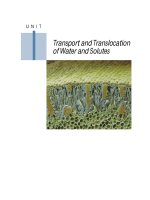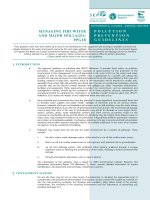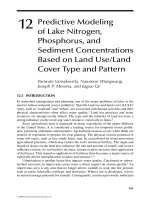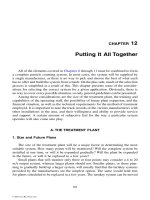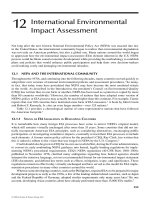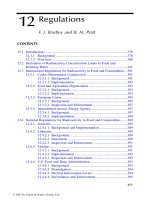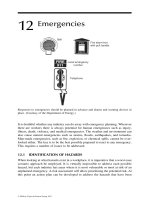Chapter 12 water and major minerals
Bạn đang xem bản rút gọn của tài liệu. Xem và tải ngay bản đầy đủ của tài liệu tại đây (1.69 MB, 98 trang )
WATER
Water
• How would you classify water?
Organic
CHO
Lipids
Proteins
Vitamins
Nutrients
Water
Inorganic
Minerals
Body Composition
About 60 % water
Water
• 50-60% body is water
– Intracellular fluid (40%)
– Extracellular fluid:
• Interstitial fluid
• Intravascular fluid
Water
• Essential Nutrient
• Survive few days without water
Functions of water
• Transport of nutrients
• Solvent for water soluble or
emulsified substances
• Lubricant
• Metabolic reactions
• Regulate body temperature
• Maintains blood volume
How much water do we
need?
• Adults: 1000 ml/1000 kcal
• So, if you consume 2000 kcal, how
much water do you need?
– 2000 ml or 2 liters
Water Recommendations
AI: 3.7 L/day. (males)
2.7 L/day. (females)
Does everyone need the
same amount of water?
• Needs vary depending upon:
– diet
– activity
– temperature
– humidity
Movement of water between
intracellular and
extracellular compartments
• Controlled by concentration of ions
inside and outside of the cell
• Water follows sodium (Na+)
Water movement
equilibrium
In this situation, water will
move inside the cell.
• What do you need to
know?
– Which organ is responsible for
regulating water loss?
– Where do we get water from?
– How do we get rid of water?
– Water follows...
– How much water do we need?
Major Minerals
Marisela Contreras
Organic
CHO
Lipids
Proteins
Vitamins
Nutrients
Water
Inorganic
Minerals
Energy Yielding
Nutrients
CHO
Lipids
Proteins
Non Energy Yielding
Water
Vitamins
Minerals
Major Minerals
Minerals
Na -Sodium
K -Potassium
Cl -Chloride
Ca -Calcium
P -Phosphorus
Mg -Magnesium
S -Sulfur
Trace Minerals
Fe - Iron
Zn - Zinc
Cu -Copper
Mn - Manganese
I - Iodine
Se - Selenium
Minerals in a 60 Kg Human Body
Major Minerals
• Mineral content in plants vary
depending of the soil!
General Functions
• Major components of Bones:
– Calcium (Ca)
– Phosphorus (P)
– Magnesium (Mg)
General Functions
• Major minerals and water balance:
– Sodium (Na)
– Potassium (K)
– Chloride (Cl)
– Phosphorus (P)
General Functions
• Major minerals in protein:
– Sulfur (S)

